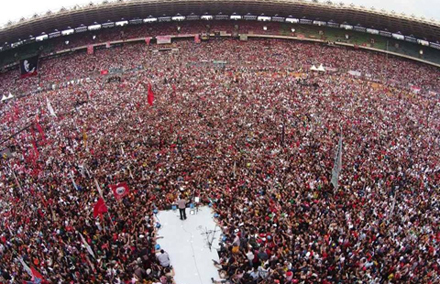Well, we always knew it was going to be a close run thing, this battle between Indonesia’s old guard and breath of fresh air.
But it seems that the winds of change cannot be stopped and the country has decided to trust in former Jakarta governor Joko Widodo.
All credible quick count polls – the best way of determining a likely winner before official counts come through on 22 July – give Jokowi a 52 to 48 per cent win in the popular vote.
That hasn’t stopped his rival and former military hard man Prabowo Subianto from huffing and puffing. According to him, and media owned by his coalition partners, he’s taken out the election.
It’s the story he’s decided to try and sell – both to the country and the world.
Wednesday night, as my New Mandala colleague Jacqui Baker reported, speaking to supporters in Jakarta, Prabowo called for them to “guard their win”.
“We from the Merah Putih coalition, have just monitored and gathered information that has come from the quick count from a number of survey institutions,” he told the gathered crowd who chanted his name and clapped.
“And from those surveys we are grateful, that from all the information that comes in, that shows we are number one – Prabowo-Hatta have the support and mandate from the Indonesian community.
“We are definitely waiting until all the data has come in and after 90 per cent of the data comes in, only then will we declare our position and attitude.
“To our members who supported the Merah Putih coalition, and the whole community, we ask you to guard and protect these results until we get the formal results from the KPU.”
For a man who made his intentions to strip back direct presidential elections explicit during his campaign, anything could be possible when it comes to assuming control of the country. This doesn’t preclude using dubious polling figures he’s paid for to make what simply doesn’t exist seem real.
How likely is it to succeed? ANU professor Edward Aspinall thinks it won’t work. According to him Jokowi’s lead is too great and too consistent in the quick counts for his victory to be discounted.
“Prabowo’s strategy is clear,” says Aspinall. “He’s paid for fake quick counts and will now try to steal the election. But I think he will fail.”
And while a smash and grab for power or the spectre of violence may just be more of the bravado and barking Prabowo has relied on in the past, one thing is certain – Indonesia has changed from this election.
In a roller coaster that had observers and voters alike on edge, Jokowi has won through, and the country has now embarked on a new path.
Much has already been made of the fact that Jokowi is everything Prabowo is not –a quietly spoken (sometimes disconcertingly silent) antithesis of his brash opponent. So stark is the difference it shouts.
Most significantly, Jokowi, as Indonesia’s seventh president, represents the first leader to not have a part in the authoritarian politics of the past. He also represents the prospect of major reform. Is it a final farewell to the oligarchs (even though he is connected to a dynasty in the form of Megawati Sukarnoputri)? Time will tell.
But it is perhaps the nature of the victory which is so astonishing. At the end of the day his campaign was built on the trust of the people and his extraordinary ability, as he did during his campaign for Jakarta governor, to connect with them.
This is despite what seemed almost a shambolic and disorganised campaign that promised to hand victory to his opposition; despite being outspent and having far less access to mainstream media to get his message out; and despite flatly refusing to counter a smear campaign that was levelled against him at every turn.
It seems as though, like the Indonesian people, he always knew which way the wind was blowing.
James Giggacher is Asia Pacific editor at the Australian National University’s College of Asia and the Pacific. He has been working with the New Mandala Indonesia Votes team to cover the country’s parliamentary and presidential elections.
 Facebook
Facebook  Twitter
Twitter  Soundcloud
Soundcloud  Youtube
Youtube  Rss
Rss 